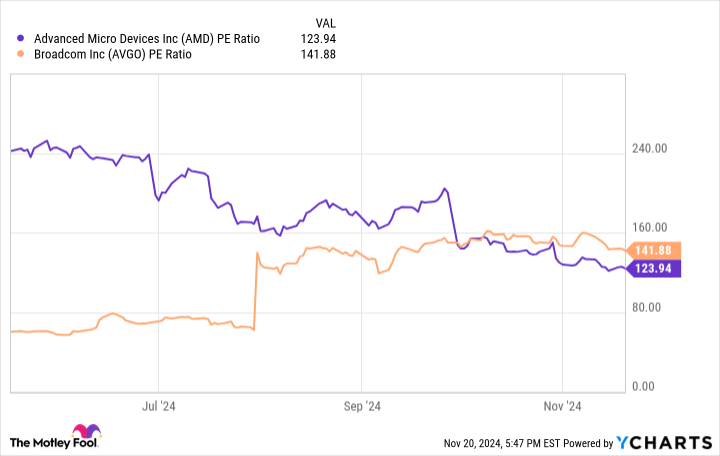Better Artificial Intelligence Stock: Broadcom vs. AMD
It’s a good time to invest in the fast-growing artificial intelligence (AI) industry. The market for AI is expected to surpass $184 billion this year, and forecast to reach more than $826 billion by 2030.
Among AI tech stocks, semiconductor firms Broadcom (NASDAQ: AVGO) and Advanced Micro Devices (NASDAQ: AMD) are two to consider investing in. The AI industry’s growth has led to outsized sales for both as customers flocked to their offerings.
Are You Missing The Morning Scoop? Breakfast News delivers it all in a quick, Foolish, and free daily newsletter. Sign Up For Free »
But if you had to choose between them, is one a better AI stock than the other? Let’s compare Broadcom and AMD to help you decide which is the better AI investment for the long run.
Broadcom is basking in the AI fervor, as sales expanded 47% year over year to $13.1 billion in its fiscal third quarter, ended Aug. 4. That’s an impressive increase, but 43% of the growth came from its acquisition of VMware, which closed last November.
VMware is famous for its virtualization software, which allows IT organizations to run multiple operating systems on a single server. But its private AI technology looks like a key strategic factor behind Broadcom’s acquisition.
Private AI shields a firm’s data from access by any AI system except those designated by the business. This is important because AI tech requires mountains of data, which is taken from various sources, including from businesses that have stored data in the cloud. Broadcom believes some companies don’t want their data shared with other businesses through AI, whether to protect intellectual property or to comply with legal requirements.
Broadcom’s private AI offering is built on the VMware Cloud Foundation (VCF) platform. VCF represented more than 80% of the VMware products booked in Q3. This illustrates strong customer demand for VCF and its ability to establish a private AI for businesses.
Broadcom also generates AI-related sales from an array of semiconductor products, including those for the computer networking, storage, and broadband industries. Its semiconductor solutions division contributed $7.3 billion of its $13.1 billion in Q3 revenue, a 5% year-over-year increase.
AMD’s strategy to capture AI market share is for its semiconductor products to concentrate on accelerated computing. This computing architecture processes data-intensive work separately from other computer tasks handled by a traditional CPU. Doing so allows complex software applications, such as AI, to operate faster and more efficiently.





Leave a Reply